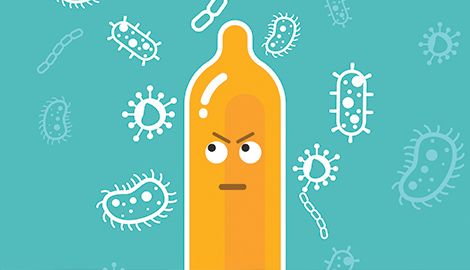What You Need to Know About Sexually Transmitted Infections (STIs)

Sex can be great – it can make us feel good and connected to the people we care about. However, a potential downside of sex can be sexually transmitted infections (STIs). STIs are very common – 1 in 5 adults in the US has an STI. Fortunately, STIs are preventable. You just need to learn about them and takes steps to protect yourself.
What are STIs and How They Spread
STIs can be really uncomfortable and some can be very harmful to your health. It is also common for a person to have an STI and not know it because many STIs do not show symptoms or you may not notice the symptoms. However, STIs can still be transmitted, even if a person does not have any symptoms.
Common STIs include:
- Bacterial vaginosis
- Chlamydia
- Gonorrhea
- Genital herpes
- Trichomoniasis
- Hepatitis
- Human papillomavirus (HPV)
- Syphilis
- HIV/AIDS
- Scabies
- Pubic lice (crabs)
STIs are passed from person to person through vaginal, anal, or oral sex with someone who has an STI. Some STIs (herpes, HPV, syphilis, scabies, and lice) can be spread from just having skin-to-skin contact. Certain STIs can also be passed to babies during pregnancy while still inside the uterus and during birth.
Get Tested to Know if You Have an STI
The only way to know for sure if you have an STI is to get tested. Young people who are sexually active should get tested for STIs at least once a year, and immediately if they have symptoms. If you have multiple sexual partners, it is even more important to get tested regularly after every new partner. You can get tested by your regular doctor or at a community clinic near you (see Helpful Resources below). If you test positive for an STI, let your current partner or any recent partners know immediately so everyone can get the tested and treated (if they test positive).
Treating STIs
Left untreated, some STIs can cause infertility (make it difficult to have a baby), and having an STI while pregnant can pose serious health risks to a developing baby. Some STIs, like chlamydia and gonorrhea, are curable with prescribed medicine from healthcare providers. Others, like herpes or HIV, are not curable, but with prescribed medicine you can live a long healthy life. It is important to be treated for an STI as soon as possible if you test positive, especially if pregnant. Also, avoid having sex while you’re on treatment because you can still spread the STI, even if you don’t have any symptoms. It’s also important that your partner(s) are treated, because it’s possible to become infected with STIs like chlamydia and gonorrhea again.
Preventing STIs
The only 100% effective way to avoid getting an STI is to not engage in any sexual activity (oral, vaginal or anal), which is also called abstinence. If you are sexually active, latex or polyurethane (plastic) condoms are one of the best ways to prevent many STIs. Learn more about condoms here. Used correctly and every time, condoms are very effective at preventing HIV, chlamydia, gonorrhea, and syphilis. If you are engaging in oral sex on a vulva or anus, dental dams offer good protection from STIs.
Talking with Partners about Condoms and Testing
Talking to a partner about wearing a condom or getting tested for STIs can be awkward. However, it is important so that both of you stay healthy. Always try to plan ahead and take a couple of condoms with you when meeting up with a partner (or potential sexual partner).
Ways to bring up condom use with a partner:
- “I want to use a condom so I can be more relaxed and enjoy sex more.”
- “Using condoms is the best way to protect us from STIs because people can have one and not know it.”
Ways to bring up getting tested for STIs:
- “Let’s get tested together before we have sex to protect each other."
- “I really care about you and want to make sure we are both healthy and stay healthy.”
Helpful Resources
- Planned Parenthood: This is a nationwide network of health centers that offers affordable sexual reproductive services and resources such as, STI testing, birth control, and free condoms.
- Title X: These clinics are federally funded to provide low-to-no cost reproductive health care, including STI testing and contraception.
- HIV.gov: This government website has a testing location tool where you can find STI or HIV testing locations near you.
- STI Information from the CDC: To learn more about STIs, visit the Centers for Diseases Control and Prevention (CDC) website.
